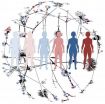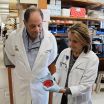(Press-News.org) The heart disease drug perhexiline is one of 101 compounds predicted to prevent cancer growth in most patients suffering from our most common liver cancer, HCC. This is an outcome from a novel simulation-based approach using personal sets of proteins of six HCC patients.
"This is the first time personalized models have been used to find and evaluate new potential drugs," says Professor Jens Nielsen at Chalmers University of Technology.
--
Our most common liver cancer, Hepatocellular carcinoma, HCC, causes more than half a million deaths worldwide every year. If the cancer cannot be surgically removed the disease is usually deadly within 3-6 months. Only 30 percent of the patients respond to the best existing drug, sorenafib. This new research now identifies 101 drug candidates predicted to prevent the cancer growth in all six studied patients, which raises hope of developing a drug helping all HCC-patients.
Cancer cells modify their metabolism in order to breed. To understand these diverse mechanisms, what metabolic enzymes are involved, when and how, has been a major focus in medicine in order to identify novel drug targets. However, this is quite a challenging task, since HCC not only involves a large number of interplays between different biological pathways, but also significant individual variations.
Finding the candidates
Average models don't give sufficiently good answers. To take the individual variations into account the researchers generated personalized proteomics data for HCC patients using the antibodies produced in the Human Protein Atlas project (read more below). The researchers then generated individual computer models for six HCC patients based on their entire, personal set of proteins and a generic map of human metabolism, which had been produced in an earlier project.
"I am excited to see how we have managed to successfully transfer our modelling approaches on yeast to study cancer metabolism," says Dr Rasmus Ågren, shared first author of the paper.
The six personal models were then used to find potential new anticancer drugs. One of the most common types of anticancer drugs is so called antimetabolites. Antimetabolites prevent the use of one or more metabolites (the small molecules that act and are produced, and whose interplay together constitute a full metabolism) by stopping the catalyzing enzymes. By simulating the effect of all possible antimetabolites – more than 3000 compounds – the computer generated potential anti-cancer drugs which could be effective in inhibiting tumor growth.
Furthermore, the researchers simulated the effect of these antimetabolites on 83 major healthy cell types in human body to predict their toxic effects. This led to the identification of 101 antimetabolites which were predicted to prevent cancer growth in all six studied HCC patients, whereas 46 antimetabolites inhibited tumor growth only in one or a few of the patients. All 147 were predicted to not be overly toxic to healthy cells.
Clinical tests
The general validity of the approach can be extended by running personalized models for more patients.
"With this approach we can find and evaluate new potential drugs, some that could be used for general treatment of HCC, and others that are highly specific for each HCC patient. We can also predict false positive drug targets that would not be effective in all patients. This would lead to more targeted and efficient cancer treatment," says Dr Adil Mardinoglu, shared first author of the paper.
One of the antimetabolites was tested in vitro on a liver cancer cell line. The tested compound, perhexiline, had an effect on viability comparable to sorafenib, demonstrating the predictive power of the computer models. Perhexiline is a drug approved for heart disease, and the potential to use it for HCC is of course interesting. As a continuation of this study, perhexiline will be tested on other cancer cell lines, since the researchers believe it may inhibit growth in other types of cancer as well. The initial experiments look very promising.
Read the article in Molecular Systems Biology: Identification of anticancer drugs for hepatocellular carcinoma through personalized genome-scale metabolic modeling
FACTS
Mass production of personalized models with new algorithm
Tinit, a new algorithm for automatic reconstruction of personalized models, was recently developed at Chalmers University of Technology, branded as tINIT. Compared to previous algorithms it allows reconstruction of functional and simulation ready models. All the tools for have been made publically available in the so called Raven toolbox.
Proteomics data in Human Protein Atlas
All of the models were generated based on the proteomics data generated in Human Protein Atlas, HPA. The Human Protein Atlas project is a world leading effort to systematically explore the human proteome in 46 different types of normal tissue and 216 different cancer tissues representing the 20 most common forms of human cancer. The atlas was recently used to generate a virtual map of human metabolism, in a collaborative project between Chalmers University of Technology and researchers at SciLifeLab. This virtual map of human cell metabolism has the most comprehensive list of the entire set of known biochemical reactions which occurs in human body. The map contains more than 8,000 reactions and 3,765 associated genes, and it represents a great resource for systems biologists working in human disorders related to metabolism.
Read the article in Molecular & Cellular Proteomics: Analysis of the Human Tissue-specific Expression by Genome-wide Integration of Transcriptomics and Antibody-based Proteomics
Drug targets and biomarkers also for other liver conditions
The same type of modelling (however using an average model) has previously been used to investigate the most common liver disease, non-alcoholic fatty liver disease. This resulted in predictions of new drug targets, new biomarkers for diagnosis, as well as suggestions for dietary interventions.
Read more about that study in the Chalmers' news item Computer model takes us closer to treatment of our most common liver disease, or the Nature Communications article Genome-scale metabolic modelling of hepatocytes reveals serine deficiency in patients with non-alcoholic fatty liver disease.
INFORMATION:
101 liver cancer drug candidates pave the way to personalized medicine
'This is the first time personalized models have been used to find and evaluate new potential drugs,' says professor Jens Nielsen at Chalmers University of Technology
2014-03-19
ELSE PRESS RELEASES FROM THIS DATE:
Gut bacteria can cause life-threatening infections in preterm babies
2014-03-19
Babies born prematurely are surviving in increasing numbers. But many withstand complications of early birth only to suffer late-onset sepsis — life-threatening bloodstream infections that strike after infants reach 72 hours of age.
While early-onset sepsis often is caused by pathogens acquired from the amniotic sac or birth canal, the causes of late-onset sepsis have been far less clear.
But now, researchers at Washington University School of Medicine in St. Louis have discovered that preterm babies' guts harbor infectious microbes that can cause late-onset sepsis.
The ...
Drinking alcohol several times a week increases the risk of stroke mortality
2014-03-19
Consuming alcohol more frequently than twice a week increases the risk of stroke mortality in men, according to a study carried out at the University of Eastern Finland. The results show that the effects of alcohol are not limited to the amount consumed, but also the frequency of drinking matters. The results were published in Acta Neurologica Scandinavica on 8 March.
Excessive consumption of alcohol is associated with a variety of different diseases. The relationship between alcohol consumption and ischaemic stroke shows a J curve pattern, which means that in people ...
GPS also helps to analyze global water resources
2014-03-19
This news release is available in German. FRANKFURT. WaterGAP (Water Global Assessment and Prognosis) is a hydrological model used to model water shortage, groundwater depletion, and floods and droughts (e.g. as impacted by climate change) over the land area of the globe. The Frankfurt hydrologist Prof. Petra Döll has examined how good a fit this model provides, using GPS observations and data from the GRACE satellite, which measures the gravitational field of the Earth. The study, published in the current issue of the scientific journal Surveys in Geophysics indicates ...
Rewrite the textbooks on water's surface tension
2014-03-19
Researchers from the University of Melbourne and University of Sydney are confident their new reaserach results will make significant differences to the calculations of surface tension of water used by the next generation of atmospheric scientists, biophysicists and engineers of technology like inkjet printers.
These latest investigations have clinched a long-standing controversy amongst the physical Chemistry community; the air-water interface is negatively charged by the adsorption of hydroxide ions.
Prof Angus Gray-Weale from the Chemistry, Department of Chemistry ...
Ottawa researchers find new pathway connected to type 2 diabetes
2014-03-19
Ottawa, ON, March 19, 2014 — Scientists at the Children's Hospital of Eastern Ontario (CHEO) Research Institute have discovered a cellular pathway that is responsible for keeping blood sugar levels low in obese or pre-diabetic people, and may prevent the onset of Type 2 diabetes. The discovery published this month in a leading journal Nature Cell Biology.
Following a meal, beta cells found in islets of the pancreas secrete insulin that helps to store food energy for future use. The inability of islet beta cells to produce enough insulin leads to diabetes. Unlike other ...
Postoperative cognitive dysfunction
2014-03-19
Older persons, in particular, tend to suffer from memory lapses and other types of cognitive impairment after undergoing surgical procedures (postoperative cognitive dysfunction, POCD). Surgery has been performed on older patients much more commonly in recent years than ever before, and their pre- and postoperative care has become an important matter. Ingrid Rundshagen, an anesthesiologist, has surveyed the available literature to find out what kinds of patients are more likely to have cognitive impairment after surgery, and how the clinical manifestations should best be ...
Diversity in UK gardens aiding fight to save threatened bumblebees, study suggests
2014-03-19
The global diversity of plants being cultivated by Britain's gardeners is playing a key role in the fight to save the nation's threatened bumblebees, new research has revealed.
Ecologists at Plymouth University, in a study published this week, have shown the most common species of bumblebee are not fussy about a plant's origin when searching for nectar and pollen among the nation's urban gardens.
But other species – and, in particular, long-tongued bees – do concentrate their feeding upon plants from the UK and Europe, for which they have developed a preference evolved ...
EU could afford to lead international climate action
2014-03-19
Major emitting countries may have to join the EU's effort much earlier to avoid a temporary overshoot of the 2 degree target, but even if they joined only in 2030, the overshoot would be limited to roughly 0.2 to 0.4 degrees Celsius. The initial unilateral leadership could be achieved at little extra costs for the EU. Late-comers would have the benefit of lower costs while they delay action but would face higher transient costs once their turn to decarbonize comes.
"The crisis-stricken EU is asking itself whether it can still afford climate leadership" says lead-author ...
Rush to prescribe: Study questions speed in giving antidepressants to grieving parents
2014-03-19
TALLAHASSEE, Fla. — Some doctors are too quick to prescribe antidepressants to parents who have suffered the death of a child either during pregnancy or within the first month of life, according to a study conducted by Florida State University researcher Jeffrey R. Lacasse.
In a study of 235 bereaved parents participating in an online support community, Lacasse found that 88 — or 37.4 percent — of them were prescribed a psychiatric medication to help them cope. Some women received prescriptions with a week of losing their children.
"This is simply too soon after the ...
Global attack needed to catch credit thieves
2014-03-19
EAST LANSING, Mich. — Stopping massive data breaches like the one that hit Target will require a more sophisticated, collaborative approach by law enforcement agencies around the world, a Michigan State University cyber security expert argues.
In a new research report for the National Institute of Justice, Thomas Holt found many hackers and data thieves are operating in Russia or on websites where users communicate in Russian, making it easier to hide from U.S. and European authorities. All countries need to better work together to fight hacking and data theft campaigns, ...
LAST 30 PRESS RELEASES:
Scientists develop new gut health measure that tracks disease
Rice gene discovery could cut fertiliser use while protecting yields
Jumping ‘DNA parasites’ linked to early stages of tumour formation
Ultra-sensitive CAR T cells provide potential strategy to treat solid tumors
Early Neanderthal-Human interbreeding was strongly sex biased
North American bird declines are widespread and accelerating in agricultural hotspots
Researchers recommend strategies for improved genetic privacy legislation
How birds achieve sweet success
More sensitive cell therapy may be a HIT against solid cancers
Scientists map how aging reshapes cells across the entire mammalian body
Hotspots of accelerated bird decline linked to agricultural activity
How ancient attraction shaped the human genome
NJIT faculty named Senior Members of the National Academy of Inventors
App aids substance use recovery in vulnerable populations
College students nationwide received lifesaving education on sudden cardiac death
Oak Ridge National Laboratory launches the Next-Generation Data Centers Institute
Improved short-term sea level change predictions with better AI training
UAlbany researchers develop new laser technique to test mRNA-based therapeutics
New water-treatment system removes nitrogen, phosphorus from farm tile drainage
Major Canadian study finds strong link between cannabis, anxiety and depression
New discovery of younger Ediacaran biota
Lymphovenous bypass: Potential surgical treatment for Alzheimer's disease?
When safety starts with a text message
CSIC develops an antibody that protects immune system cells in vitro from a dangerous hospital-acquired bacterium
New study challenges assumptions behind Africa’s Green Revolution efforts and calls for farmer-centered development models
Immune cells link lactation to long-lasting health
Evolution: Ancient mosquitoes developed a taste for early hominins
Pickleball players’ reported use of protective eyewear
Changes in organ donation after circulatory death in the US
Fertility preservation in people with cancer
[Press-News.org] 101 liver cancer drug candidates pave the way to personalized medicine'This is the first time personalized models have been used to find and evaluate new potential drugs,' says professor Jens Nielsen at Chalmers University of Technology





